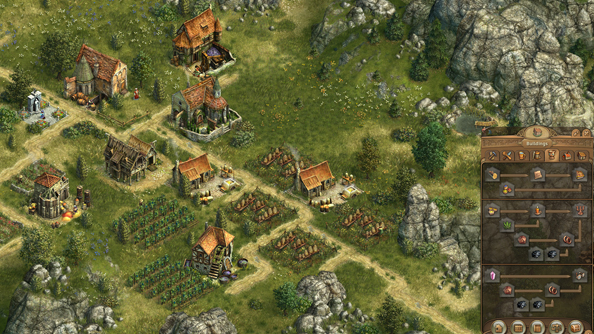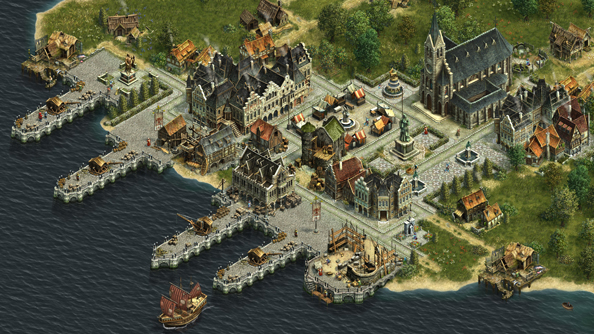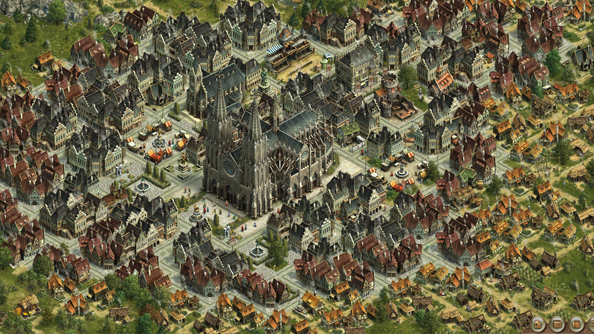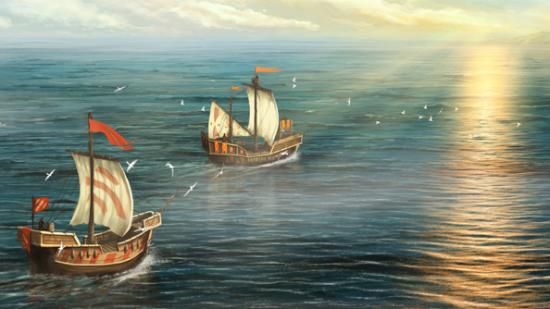The satisfaction of the solution is a powerful thing, even when only experienced second hand. Tom Bolton, the Lead Designer on Anno Online, has a small group of peasants who are frustrated at having to keep on wearing their stinky travelling clothes, and they’d like some new ones, thank you very much. And so he builds a hemp farm, and then a weaver, to turn the hemp into garments. Soon enough, the little angry face over the peasant’s clothing needs starts to slip away into the green, and the problem is solved.
Only now they’re after some spiritual warmth, on top of the physical. So he builds a church in the middle of the town, and another problem is solved with a satisfying thunk.
“The next step from here would be to upgrade the peasants to citizens, and they would start demanding bread. But this starting island is not fertile for wheat, so that’s your first problem.” Actually Tom, that’s our third. We’ve already dealt with two.
Anno Online is a free to play browser based version of the Anno city-building games, only here it’s about injecting a little social life into the series by making you dependent on resources that you might not have an abundance of. “It’s very asymmetrical in terms that one island may create lots of trees and one island can support no building materials at all.”
The lucky thing is that you’ve got multiple islands per player, allowing you to specialise on the micro scale but create a more rounded supply chain on the macro. One island might be your food production powerhouse, while another can house your major city. The only problem is, once you reach a certain size, self-sufficiency becomes a pipe dream.

Which is where other players come in. You have a problem, they have a solution. And you might have solutions to their problems. “At the start the players will have the same starter island, but as the player does searches they’ll find islands with different values based on fertility, where rivers are and what deposits there are on the island.” Tom explains, and once you’ve got an island that’s a gold mine (maybe literally) for one kind of resource, you can trade that resource with other players to get the things you need.
“Players will be able to do private trades between one another, but there will be an auction house where players will announce the type of goods that they’re trading, the ships they can ship those goods in, and the wares they’re requesting for those goods.” It’s at this point that I can’t help but get a little excited at what has been said, but only because I’m reading between the lines. Scams, dodgy trades, haggling skills and deals gone bad are all running around in my mind, and I’m, not for the first time during this presentation, thinking of EVE Online. In regards to a browser based city building game. Huh.
It’s because it’s forcing players to interact, and creating an economy that’s almost entirely reliant on player input. It’s a level of maturity to give the players control over what they want to do, and more importantly how they want to do it, that’s similar to CCP’s opus. Except, of course, there’s the mildly unpleasant head of microtransactions rearing in Anno Online’s bowells.

Although, to be fair to Blue Byte, the advantages paying players get do seem to be reasonable. “Paying is by no means a requirement.” Tom Bolton is quick to reassure me. “The way that it will work is that the player can unlock new islands sequentially, and we intend to have four island slots available to everyone, but then we’ll have four additional slots available to paying players.” Which means paying players can be more self sufficient, and have a larger impact on the market; both things that make paying an attractive proposition without hamstringing free players.
“The player can produce their own ships, which takes time and resources, whereas paying players can buy ships outright without owning a shipyard.” Little conveniences like this are the way to go with microtransactions, saving time and ticking off problems on the massive to-do list that Anno Online presents you with.
Creating a game with ‘casual’ in mind can’t be easy; you have to have something that will stand up to sustained play for your hardcore fans, but at the same time can be played in the ten minute breaks that pepper people’s days. Anno Online is a game where every solution creates a new, more interesting problem, and by the time you’ve got a thriving city, you’ve got enough little problems on your plate that there’s never nothing to do, but it’s hopefully well built enough that things will survive without you if you have to actually do some work with your day instead of playing browser games.

Like all of Blue Bytes’ new Free to Play games, it’s running in Flash 11, and of the three that I saw in their Dusseldorf office, Anno Online was the most visually impressive, throwing upwards of two thousand graphical components on the screen at once. At the beginning of the presentation we were shown a massive city, with a huge Cathedral being built in the centre of it. This was between three and four months of play, all concentrated on this one metropolis. It was bustling, and it was beautiful.
And, when Anno Online launches later this year, it could well be yours. And then you can show it off to all your friends, and they can go back to their shanty towns and they can cry a little bit.
